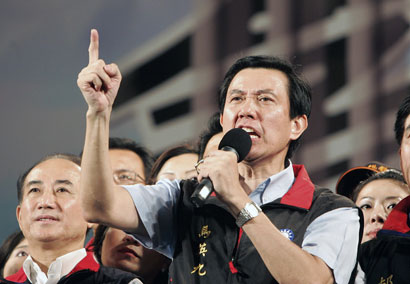Embattled Chen refuses to resign
(China Daily)Updated: 2006-11-06 06:42
Taiwan's embattled "president" Chen Shui-bian refused to resign Sunday, denying prosecutors' allegations that he and his wife embezzled public money.
After avoiding the public for two days, Chen said in a televised prime-time speech that the corruption accusations announced on Friday were painful and felt like a "political death sentence."
With the accusations set to fuel growing anger against the unpopular leader and fire up a new campaign to recall him, Chen struck a defiant tone in the hour-long address from his office.
"I decided to face the prosecutors' questioning and investigation because I had nothing to hide," Chen said.
"How can Chen Shui-bian be that kind of person, collecting false invoices to embezzle money?" he added.
He resisted growing demands to quit with 18 months left in his second term.
But he said: "If my wife is convicted, then because the prosecutors believe my wife and I act together, I cannot escape. I'm willing to resign before my term is up."
Chen added that he would not appeal to higher courts if she was convicted.
His overture back-pedalled from earlier remarks that he will resign if he or his wife is indicted for corruption charges.
Chen and his family have been dogged by graft allegations for months, but the latest scandal blew up on Friday when prosecutors indicted his wife Wu Shu-chen on embezzlement, forgery and perjury charges.
Wu was accused of taking 14.8 million New Taiwan Dollars (US$450,000) from a special "diplomacy" fund between 2002 and 2006, prosecutors said.
Receipts did not account for the missing money, they said.
The prosecutors also said there was evidence Chen was involved, but "presidents" are immune to such charges while in office.
"The 14.8 million New Taiwan Dollars, we absolutely did not put in our own pockets," Chen said yesterday.
He also complained that the regulations for the special diplomatic fund are "very confusing and difficult to follow."
He then launched into a long, technical explanation about how the fund works, and argued that the rules for using it need to be more flexible.
Thousands of protesters marched in the streets this weekend in Taiwan's two biggest cities. They honked air horns and carried signs saying, "End Corruption."
Protester Peter Huang, a businessman, said in Taipei that Chen must quit immediately. "Chen had better admit his errors. The longer he tries to hang on, the more catastrophic the outcome will be," he said.
Opposition "lawmakers" have planned a third attempt to recall Chen for today. They made a similar attempt in June and in October, but failed to muster the required two-thirds majority.
The opposition is hoping that the ruling Democratic Progressive Party (DPP) "lawmakers" will begin defecting to their cause, giving them enough votes to pass the recall measure by late November. If the proposal passes, it would set up an island-wide referendum to determine Chen's fate.
Chen should step down immediately as he has lost the trust of the people of Taiwan for his alleged corruption, KMT Chairman Ma Ying-jeou said yesterday at a gathering in Taipei.
Ma urged the DPP to recognize the situation and support the dismission of Chen. "It is impossible for Chen to stay on, if the DPP voices (its support)," he said.
"If they move to clear their own house, they will still have a future. We don't want to see the DPP sinking into history."
Already, the small pro-Chen Taiwan Solidarity Union has announced that its 12 "lawmakers" will be encouraged to vote for the recall measure.
The DPP has called on Chen to provide an explanation. Party spokesman Tsai Huang-lang said the DPP had held "crisis" meetings over the weekend to decide what to do, but it would not make a statement until after Chen's speech.
Some DPP "legislators" have called on Chen to consider the public demand before "the situation forces him to step down."
One senior DPP "lawmaker," Lin Cho-shui, said in a speech yesterday that he is disillusioned with Chen and unsatisfied with how the party has dealt with the latest allegations.
"As a DPP member, I feel like I've lost face," he said.
A big concern for the DPP is that sticking with Chen could cost the party dearly in "legislative" and "presidential" polls due in late 2007 and early 2008.
|
||
|
||
|
|

